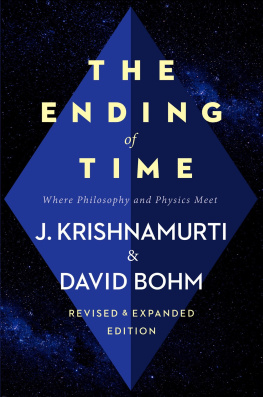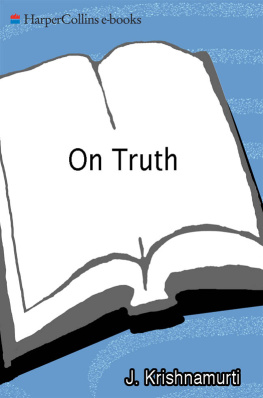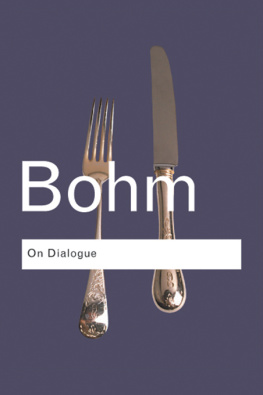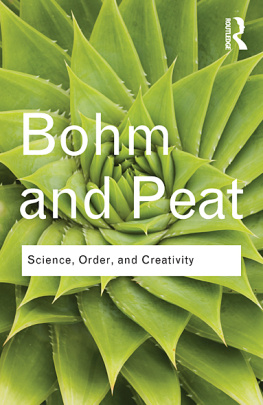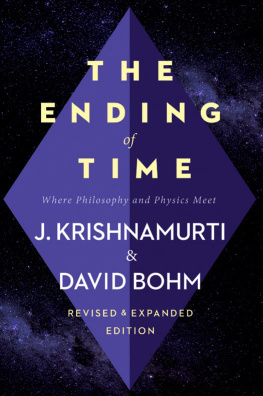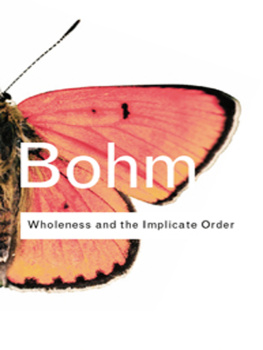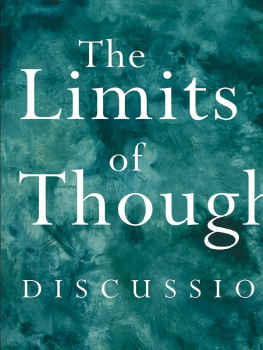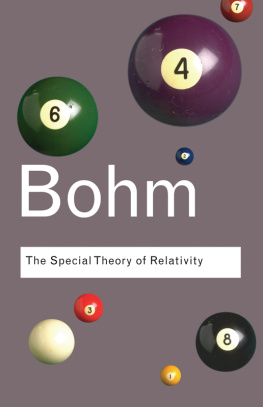Krishnamurti and David Bohm - Truth, Actuality and the Limits of Thought
Here you can read online Krishnamurti and David Bohm - Truth, Actuality and the Limits of Thought full text of the book (entire story) in english for free. Download pdf and epub, get meaning, cover and reviews about this ebook. publisher: Krishnamurti Foundation Trust, genre: Religion. Description of the work, (preface) as well as reviews are available. Best literature library LitArk.com created for fans of good reading and offers a wide selection of genres:
Romance novel
Science fiction
Adventure
Detective
Science
History
Home and family
Prose
Art
Politics
Computer
Non-fiction
Religion
Business
Children
Humor
Choose a favorite category and find really read worthwhile books. Enjoy immersion in the world of imagination, feel the emotions of the characters or learn something new for yourself, make an fascinating discovery.

- Book:Truth, Actuality and the Limits of Thought
- Author:
- Publisher:Krishnamurti Foundation Trust
- Genre:
- Rating:5 / 5
- Favourites:Add to favourites
- Your mark:
- 100
- 1
- 2
- 3
- 4
- 5
Truth, Actuality and the Limits of Thought: summary, description and annotation
We offer to read an annotation, description, summary or preface (depends on what the author of the book "Truth, Actuality and the Limits of Thought" wrote himself). If you haven't found the necessary information about the book — write in the comments, we will try to find it.
Truth, Actuality and the Limits of Thought — read online for free the complete book (whole text) full work
Below is the text of the book, divided by pages. System saving the place of the last page read, allows you to conveniently read the book "Truth, Actuality and the Limits of Thought" online for free, without having to search again every time where you left off. Put a bookmark, and you can go to the page where you finished reading at any time.
Font size:
Interval:
Bookmark:
Truth, Actuality and the Limits of Thought
Copyright 1975 by Krishnamurti Foundation Trust Ltd.
TRUTH, ACTUALITY AND THE LIMITS OF THOUGHT
12 dialogues between J. Krishnamurti and David Bohm [1975]
CONTENTS
ONE
Krishnamurti: I was thinking about this question in Ojai, about what is truth and what is reality and whether there is any relationship between the two, or whether they are separate, eternally divorced, or are they just projections of thought? And if thought didnt operate, would there be reality? I thought that reality comes from res, thing, and anything that thought operates on, or fabricates, or reflects about, is reality. And thought, thinking in a distorted, conditioned manner, is illusion, is deception, is distortion. I left it there, because I wanted to let it come rather than my pursuing it.
David Bohm: The question of thought, reality and truth has occupied philosophers over the ages. It is a very difficult one. It seems to me that what you say is basically true, but there are a lot of points that need to be ironed out...
K: Not having read philosophers and all that gives one a tremendous advantage, because one can start with knowing nothing and then begin to enquire. But if one begins to translate it into what the scholars and philosophers talked about, then one is getting lost...
DB: Now, one of the questions that arise is: if we say reality is thought, I would extend it to say that reality is something reflected in consciousnesswhat would you think about?
K: Are the contents of consciousness reality?
DB: Thats the question, yes, and I thought we can use thought as equivalent for consciousnessin its basic form, but it should include for the sake of completion, feeling, desire, will, reaction and so on, if we want to explore the connection between consciousness, reality and truth.
K: Would you separate consciousness with its content, reality and truththese three things?
DB: I would agree that truth goes beyond the other two, but this has been an old question between philosophers as to what is truth...
K: Yes. And how do they answer it?
DB: In hundreds of ways! But one of the points Id like to bring up is: there is thought, there is consciousness, and there is the thing of which we are conscious. And as you have often said, the thought is not the thing.
K: Yes...
DB: We have to get it clear, because in some sense the thing may have some kind of reality independent of thought; we cant go so far as to deny all that. Or do we go as far as some philosophers, like Bishop Berkeley, who has said that all is mind?
Now, I would like to suggest a possibly useful distinction between that reality which is largely created by our own thought, or by the thought of mankind, and the reality which one can regard as existing independently of this thought. For example, would you say nature is real?
K: It is, yes.
DB: And it is not just our own thought...
K: No, obviously not.
DB: The tree, the whole Earth, the stars...
K: Of course, the cosmos. Pain is real...
DB: Yes. I was thinking that illusion is real, in the sense that it is really something going on, in a person who is in a state of illusion.
K: To him it is real.
DB: But to us it is also real because his brain is in a certain state of electrical and chemical movement, and he acts from his illusion in a real way.
K: In a real way, in a distorted way.
DB: Distorted but real. Now it occurred to me that one could say that the false is real but not true. This is the thing which might be important.
K: Say, for instance: is Christ real?
DB: Well, he is real in the minds of people who believe in him, in the sense we have been talking...
K: Who created him...
DB: Besides, there might have been a real person...
K: Jesus, even if there is some doubt about all that business, Jesus was realif one believed he existedand thought created ChristChrist is an illusion.
DB: But at the same time this illusion is real in the minds of those who believe in him.
K: You see, the Buddha, as a person, was real. What he said, outside the field of thought, is truth...
So, we want to find out the distinction between truth and reality. We said anything that thought thinks about, whether unreasonably or reasonably, is a reality. It may be distorted or reasoned clearly, it is still a reality. That reality has nothing to do with truth. Now we want to know in Sanskrit if there is such a difference?
Dr Parchure: There is...
K: What is reality in Sanskrit?
P: It is written out in literature as maya.
K: Maya? Maya means illusion!
P: Yes, but it appears like truththerefore its called maya. They say that the world is in a dream, but when you are in the dream you think of it as real. So they say that we live all the time in the world of maya, taking the unreal as real.
DB: And what is [the Sanskrit word for] truth then?
P: Truth is satyam.
K: And what is the relation between satyam and maya?
P: Satyam is described negatively: when the cloud of maya disappears, that is satyam.
DB: Yes, but we have to say besides, that in some way reality involves more than mere thought. There is also the question of actuality. Is the thing actual? Is its existence an actual fact? According to the dictionary, the fact means what is actually done, what actually happens, what is actually perceived.
K: Yes, we must understand what we mean by the fact. According to the dictionary, fact means that which is done, that which is actually happening.
DB: Were also saying that reality is a thing which stands independently of thought. Suppose you are walking on a dark road and you think you see something. It may be real, it may not be real. One moment you feel that its real and the next moment that its not real. But then you suddenly touch it and it resists your movement. From this action its immediately clear that there is a real thing which you have contacted. But if there is no such contact you say that its not real, that it was perhaps an illusion, or at least something mistakenly taken as real.
K: We are saying that anything that thought thinks about, or reflects upon, or projects, is reality, and that reality has nothing to do with truth. The two are eternally separated; you cant come from this reality to truth...
The Hindu scholars said: remove the illusion, maya, then reality is. I can remove maya by whatever means, but truth might not exist... Therefore its not a question of removing, but of seeing reality where it belongsthats the art of seeing: to place reality where it is, and not move from that in order to get to truth. You cant move from here to there and call that truth.
P: You are saying the art of seeing, but in what state of mind is this seeing taking place?
K: It just sees; I see those birds on the wallpaper and I know that is the product of thought. But I know it is realI dont call that illusion, anymore than I can call you hitting me illusionit is violence, it is a reality, not an illusion.
Id want to discuss this point, sir: can I move from reality to truth? Or there is no movementmovement means timeso is there a stop to timewhich is thought?
DB: But to come back to realitywhich is a thingany thing is necessarily conditioned. Any form of reality is necessarily conditioned.
K: It is conditioned. Lets accept that.
DB: Because the distortion is real. This is a key point. Thus, an illusion is still a form of reality which is conditioned. The distortion is real; for example, the mans blood may have a different constitution because hes not in a balanced state. So every thing is determined by conditions; all things are mutually interrelated in the way of mutual conditioning, which we call influence. In physics thats very clear, all the planets influence each other, the atoms influence each other, and I wanted to suggest that maybe we could regard thought and consciousness as part of this whole chain of influence.
Next pageFont size:
Interval:
Bookmark:
Similar books «Truth, Actuality and the Limits of Thought»
Look at similar books to Truth, Actuality and the Limits of Thought. We have selected literature similar in name and meaning in the hope of providing readers with more options to find new, interesting, not yet read works.
Discussion, reviews of the book Truth, Actuality and the Limits of Thought and just readers' own opinions. Leave your comments, write what you think about the work, its meaning or the main characters. Specify what exactly you liked and what you didn't like, and why you think so.

